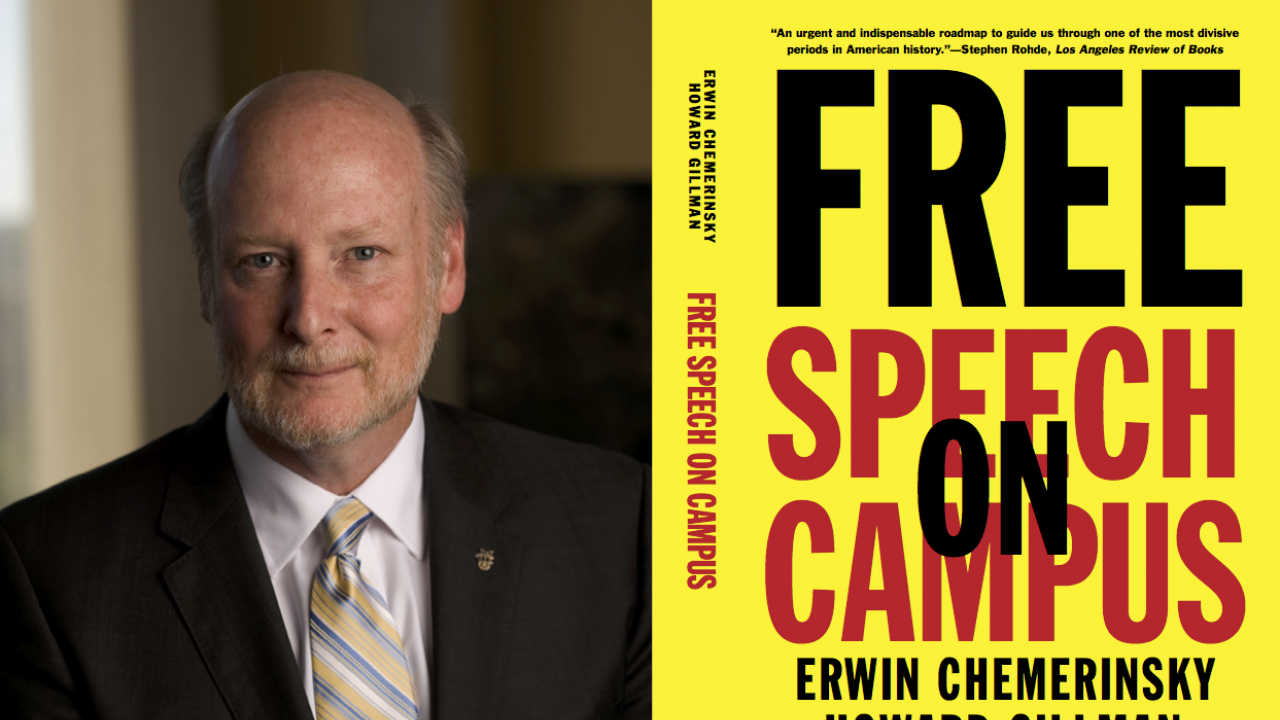
Event Date
How can a university provide a supportive, nondiscriminatory, inclusive learning environment while still protecting free speech? UC Irvine Chancellor Howard Gillman tackled that question in a recent book, and he will be at UC Davis to discuss the topic on Thursday, Oct. 4. Gary S. May is sponsoring this program as a chancellor’s special event.
Gillman’s lecture will be at 4 p.m. in the multipurpose room at the Student Community Center. Or, you can watch the livestream.
If you’re coming to the event, please RSVP here. Refreshments will be provided. See below for parking information.
Gilman co-wrote Free Speech on Campus with Erwin Chemerinsky, who, at the time served as dean of the UC Irvine School of Law and who now serves as dean of the law school at UC Berkeley.
In a joint lecture by the authors last year, Gilman said: “For higher education there must be one anchoring principle, and for us that principle is any idea must be expressible on a campus without fear for censorship or punishment.”
He noted that instructors’ freedom is not as broad, because faculty members work in the “professional zone” of free speech, which he said is always linked to norms of professional competence and integrity — giving universities the right to regulate what can be discussed in class time, and to require a link between the content of class discussion and the course material, for example.
“But, on top of that, as a result of the Berkeley Free Speech Movement, an additional zone of free speech was insisted upon correctly: Outside of the professional environment, the Berkeley Free Speech Movement established the proposition that the public spaces in campus should be free for the expression of even unprofessional, uncivil, profane and even hateful points of view.”
But while public spaces remain open to free speech, universities can draw the line at harassment, true threats or other speech acts unprotected by the First Amendment, as well as discrimination that encroaches upon dormitories and classrooms, for example.
The Gillman-Chemerinsky book ends “with an agenda of proactive activity, setting up structures to ensure that acts of discrimination are identified, organizing programs, sensitizing people to the harms of hateful speech, educating a community about what is behind the hate speech that some people insist now needs to come to campus to illuminate the issue rather than to suppress the issue and, most importantly, campuses, even if they find themselves protecting speech that is inconsistent with their values, doesn’t mean that campuses cannot find their voice on those values.”
The book: Free Speech on Campus
Published by Yale University Press, which describes the volume as follows: "In this clear and carefully reasoned book, a university chancellor and a law school dean—both constitutional scholars who teach a course in free speech to undergraduates—argue that campuses must provide supportive learning environments for diverse student body but can never restrict the expression of ideas. This book provides the background necessary to understand the importance of free speech on campus and offers clear prescriptions for what colleges can and can’t do when dealing with free-speech controversies."
Reviews from the publisher's website:
“Cogent, concrete, and controversial, Free Speech on Campus might well help launch candid and long overdue discussions, on campuses and elsewhere, of hot button issues, including ‘hate speech’ codes, trigger warnings, safe spaces, threats and harassment, protests that disrupt public events, online speech, and racist symbols.”—Glenn Altschuler, Huffington Post
“A virtue of Free Speech on Campus is its attentiveness to the history and importance of freedom of speech and thought in higher education.”—Jonathan Marks, Weekly Standard
“A thoughtful and insightful defense of both free speech on American campuses and the need to develop and protect inclusive learning environments, plus lots of good advice for current campus leaders.”—Peter McPherson, President, Association of Public and Land-grant Universities
“Erwin Chemerinsky and Howard Gillman have written a concise and valuable history of the evolution of freedom of speech policies and laws in the U.S. . . . A masterful analysis of a cherished American right and a must-read for higher education leaders.”—Mary Sue Coleman, President, Association of American Universities
Event parking
Parking, if needed, is recommended in the Pavilion Parking Structure at the corner of Dairy Road and Hutchison Drive (west of the venue) or Parking Lot 5 on Old Davis Road (east of the venue). Please display valid UC Davis parking permit or purchase daily permit from machine for $9 (Visa, MasterCard or exact cash).
Please allow extra time to park and walk to the venue. Bicycle parking is located nearby.
This event is sponsored by the UC Davis Chancellor’s Office and a private donation to foster free speech on campus.